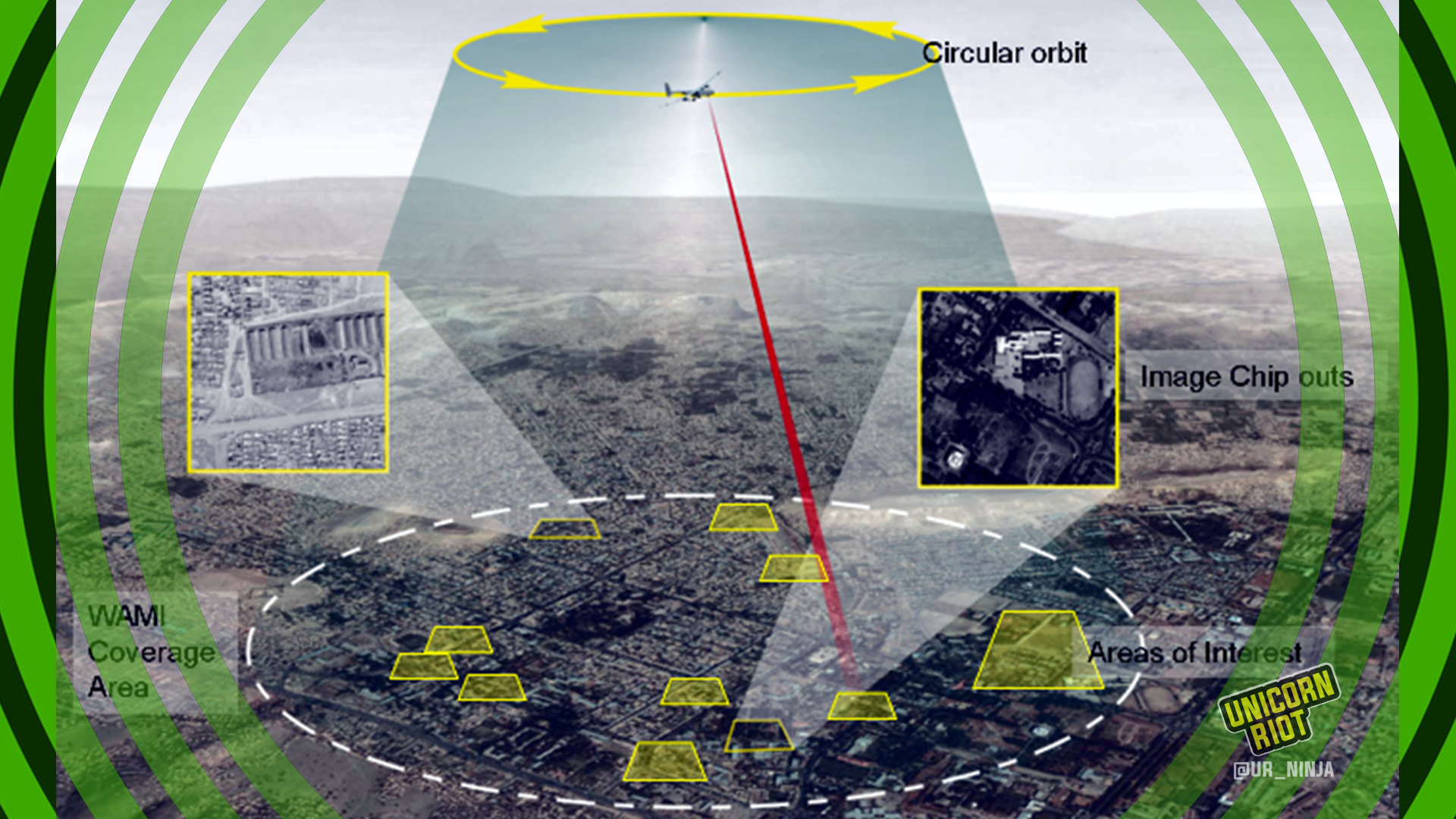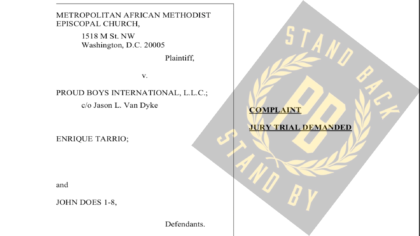PSS Spy Plane Plan Slides Sneakily into St. Louis
St. Louis, MO – Aerial surveillance company Persistent Surveillance Systems (PSS) negotiated a plan in secret with a member of the St. Louis Board of Aldermen with hopes of flying multiple spy planes simultaneously over the city’s metro area in 2021. The plan that PSS and the St. Louis Metropolitan Police Department (SLMPD) are pushing the Board of Aldermen to adopt is up for a vote on January 5 and has dire privacy and civil liberties implications. PSS has a history of secrecy and their plan for St Louis could set a dangerous new benchmark for dystopian police surveillance.
Board Bill 200 (BB200) to contract PSS for “aerial surveillance research” poses numerous civil liberties concerns. PSS’s plan would include three aircraft, each capable of monitoring 32 square miles, flying for 18 hours per day over the St. Louis Metro area for a “minimum of 40 hours per week.” These sky cops would then feed data to a police fusion center where suspect pixels would be identified as they passed any city accessible CCTV camera. As the bill puts it, “analysts will track individuals and vehicles that pass the City’s [camera network].”
The proposed policy continues with further explanation of other systems that could be combined with the spy plane data to maximize their intelligence output. “[PSS] may integrate its iView software to accept and utilize the CAD, the Real Time Crime Center (RTCC) camera system, the Shot Spotter Gunshot Detection System, and the License Plate readers to help make all of the systems work together to enhance their ability to help solve and deter crimes.”
The spy plane proposal pays lip service to privacy, claiming that “at a resolution of one pixel per person or vehicle, it is not possible to determine any identifiable characteristic including an individual’s ethnicity, sex, or clothing or, make, model or license plate.” (This misleading disclaimer is contradicted by the intended use of aerial surveillance data to be combined with other surveillance methods such as traffic cameras and license plate data.)
Such a sweeping change to a city’s policing (which directly impacts the day-to-day lives of those beneath the proposed spy plane fleet) should be done with as much transparency and public input as possible. Yet this attempt to implement an Orwellian sky tracking system over the people of St. Louis was negotiated behind closed doors. As STLToday.com noted, “Oldenburg [the bill’s sponsor] said his new bill … was drafted by attorneys for the Ohio company.”
When fellow members of the St. Louis Board of Aldermen found out about BB200 they reacted on Twitter. Annie Rice, who represents Ward 8, asked, “Who wrote or negotiated this contract for 3 years of persistent aerial surveillance over St. Louis that’s being introduced tomorrow in #BB200? I’ve been told it wasn’t Public Safety Director Edwards nor Chief Hayden, so who?”
Who wrote or negotiated this contract for 3 years of persistent aerial surveillance over St. Louis that’s being introduced tomorrow in #BB200? I’ve been told it wasn’t Public Safety Director Edwards nor Chief Hayden, so who? https://t.co/TNp28mEcJo
— Annie Rice (@AnnieRiceStL) December 10, 2020
Megan Green, Alder for Ward 15 said, “Rather than learn from Baltimore’s mistakes #STL is following right behind them with BB200 being introduced tomorrow to contract with PSS.”
I asked Alderwoman Green about the process thus far and she responded:
“I find it quite alarming that these negotiations have taken place behind closed doors and have not included the stakeholders, such as the criminal justice coordinating council. Increasing policing and surveillance are not going to solve St. Louis’ crime issues. Investments in alleviating poverty and building trust between our residents and local government will.”
St. Louis Alderwoman Megan Green
Fortunately for those who would rather not see a city adopt an aerial dragnet, the spy plane bill is facing opposition via Board Bill 95. Alderwoman Green details the spirit of the measure:
“BB 95 is a step toward building trust because it gives community oversight of currently existing surveillance technologies and future technologies. Currently, St. Louis residents do not know the ways in which they are being monitored. BB 95 would bring transparency.”
St. Louis Alderwoman Megan Green
When asked where St. Louis should be concentrating, Green said that resources need to be spent on social ills such as education, affordable housing and that “none of these measures involve surveillance, they involve shifting public dollars to address root causes of crime.”
The American Civil Liberties Union of Missouri explains BB95 thusly, “this proposal would require city entities to come up with a plan for how they will use surveillance technology, commit that plan to paper, hold public meetings to hear community concerns, and submit the plan to the Board of Alderman for approval.”
Persistent Surveillance Systems are no strangers to operating under as much cover as possible. PSS likely operated in Mexico without anything more official than a handshake agreement with the Mexican state out of fear for the cartels whom they were targeting in Juarez.
Andres Lajous, who now serves as Secretary of Transportation for Mexico City, filed a request for any contracts or other documents pertaining to PSS. Lajous’s query with the Secretary of State of Chihuahua turned up no responsive documents.

Further evidence pointing toward the likelihood that PSS kept their official relationship with Mexico mum comes from another information request, this time querying the Mexican state of Baja California. Similar to the request made by Lajous, the Baja request turned up nothing. Interestingly, this lack of official records and the subsequent appeal came up during a November 2017 meeting in which the minutes indicate that an error was made upon the original records query but after adjusting for that there were still no responsive records.
This sort of operational security is understandable given the fractious nature of the Mexican state and the infiltration by the cartels. This was a foundational period of time for PSS and appears to have contributed to a culture of secrecy surrounding the company’s operations. Now, instead of hiding information from criminal cartels, PSS works to hide from the concerned eyes of the American public while also trying to market a system that tracks their every move around a city.
In this specific case, St. Louis could become subject to a multi-aircraft aerial surveillance operation more pervasive than is needed in most war zones. In fact, this technology was originally developed for battlefields, as has now been extensively reported.
Benjamin Snyder, an expert on PSS and an Assistant Professor of Sociology at Williams College, summed up his main concern with BB200:
“The main thing that hasn’t been addressed (and I don’t think it can be) is the data retention issue. They will still end up hanging on to the majority of the imagery because you cannot carve out a section of the footage related to just one crime. If the dataset has an active case in it, the whole dataset gets archived. So the long section on how they are going to regulate data retention will ultimately be moot given the amount of crime in St. Louis. Like in Baltimore this summer, every dataset is going to have an active case in it, most likely. With a Court Order, that old dataset can be looked at again for crimes that are totally unrelated to the crime that initially caused the data to be retained. So, that’s a time capsule of citizen movements, and that’s a big worry for privacy.
There are some other issues in there: the stuff around hit-and-runs and illegal dumping seems problematic and suggests some mission-creep. If I were an Alder, I would want to know how those crime categories were decided upon and if there will be any democratic engagement around that list.”
Benjamin Snyder, Assistant Professor at Williams College
Other aspects of the St. Louis bill that raise concern stem from the door being left open for “third-party data miners” as Alderman Dan Guenther told STLToday.
BB200 also proposes that victims of crime will also be tracked if that person can assist in a police investigation. Officer discretion will also be paramount to the operation of the surveillance system: “Such tracking does not necessitate a court order—although warrants are an important limitation on officer discretion in many cases, discretion is limited naturally when analysts simply are tracking subjects traveling to and from the documented scene of a crime within the data set of one Aerial Flight of no more than nine hours.”
An era in which people are increasingly conflating surveillance with convenience and safety requires the constant vigilance of those who understand the value of privacy. St. Louis, and the rest of the United States, are facing a choice between intrusive and often ineffective surveillance-based policing or something more civilized and in line with what so many people protested for in 2020. Alderwoman Green offered an alternative vision:
“My version of public safety in St. Louis is one in which we have a high-quality education system, because we’ve stopped the massive tax handouts that go to build luxury apartments and defund our schools. It’s one where we make real city investments in affordable housing as St. Louis was experiencing an affordable housing crisis even before the pandemic. Drug addiction needs to be treated as a public health issue and not a criminal justice issue, and we need to give folks access to treatment.”
St. Louis Alderwoman Megan Green
BB200 and BB95 go up for vote on January 5.
Follow us on X (aka Twitter), Facebook, YouTube, Vimeo, Instagram, Mastodon, Threads, BlueSky and Patreon.
Please consider a tax-deductible donation to help sustain our horizontally-organized, non-profit media organization:



